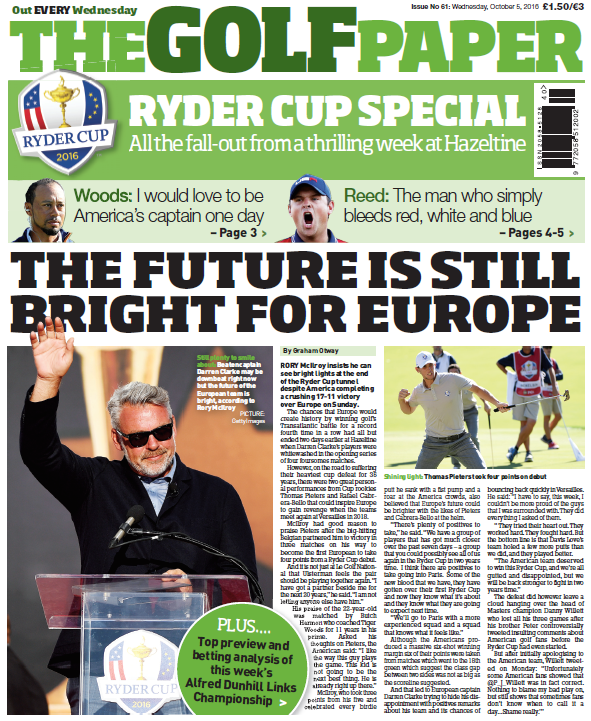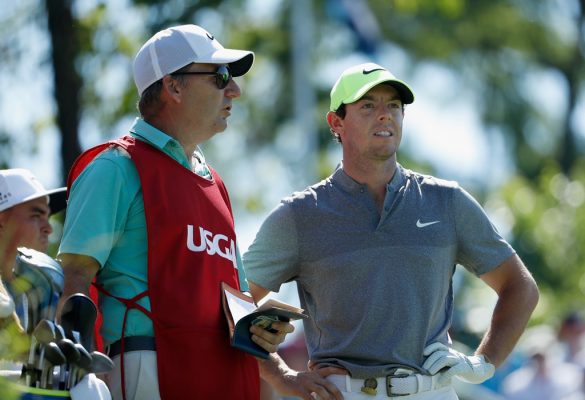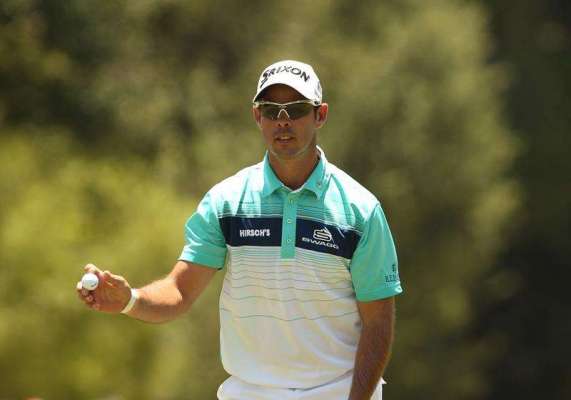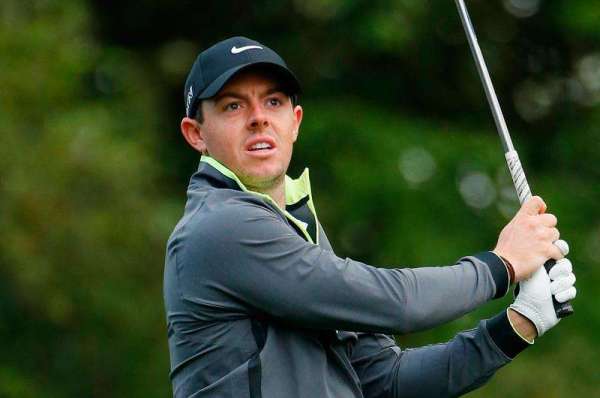In the Golf Paper
McIlroy remains the man to beat at Augusta
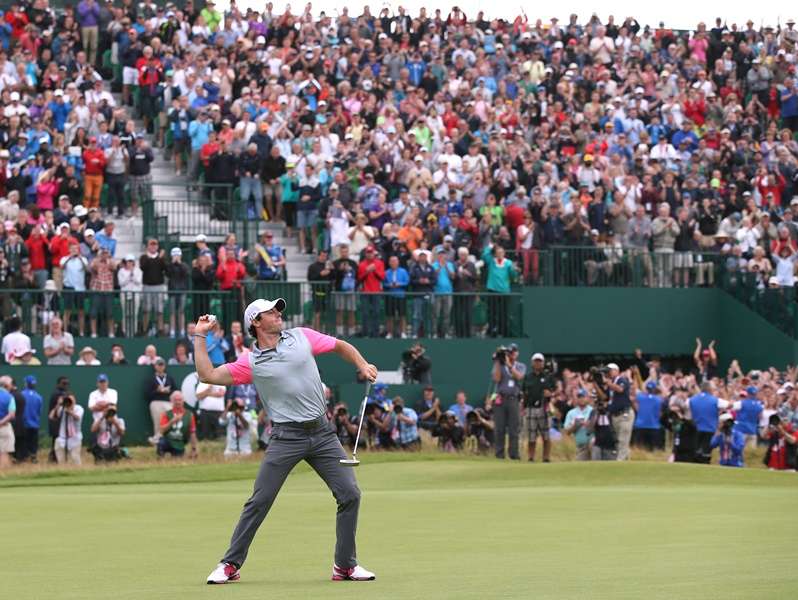
On top form: McIlroy was at his best when he won the 2014 Open at Royal Liverpool (photo by Action Images / Paul Childs)
by John Huggan
It won’t be like he is pitching up at Augusta National with no expectations. We are, after all, talking about a four-time Major champion who requires “only” a Masters victory to become just the sixth man in history to complete the career Grand Slam. And he remains, by common consensus if not current mathematical calculation, the best golfer on the planet.
But for Rory McIlroy American golf’s so-called ‘rite of spring’ will this year carry with it a little less in the way of outside pressures. Others will drive down Magnolia Lane with more on their minds. The new world number one – at least according to the rankings – Jason Day will be hailed as the tournament favourite. And the man the Australian deposed, Jordan Spieth, is, if his body language during last week’s World Match Play Championship is any guide, a man presently at odds with almost every aspect of his game.
So maybe playing well enough to win but not actually doing so – as Rory has already done more than once in 2016 – is the way to go in the run-up to what would surely be the most significant win of his already distinguished career so far. Someone joining the game’s most elite group – Gene Sarazen, Ben Hogan, Gary Player, Jack Nicklaus and Tiger Woods are the current members – doesn’t exactly happen every day.
“Rory is easily the player with the most potential,” points out CBS commentator and renowned coach, Peter Kostis, who works with Englishman Paul Casey.
“That is what people are alluding to when they say that he should be number one now. But it depends on how you define number one. Is it for this week? Or this month? Or this year? The next ten years? That’s a lot of questions and just part of why the world seems to have been all lathered up since Tiger Woods lost the position. For 12 years nobody gave a damn about world number one. We knew it was Tiger.
“Rory is headed wherever his ambition and dedication and discipline want to take him. I see no limits in that regard. I am a huge fan of his swing.
“When you watch Rory you get the feeling that everything about him is reacting to the clubhead. He’s cocking and swinging the club to the top. Then he’s releasing the clubhead through impact. His body, while propelling the club, is subservient to his feel for the clubhead. And that is what is most elegant about Rory’s swing.”
For all the many attributes of those in the upper echelons of the world rankings, no one plays golf with quite the same combination of panache and passion as McIlroy. It is a style that has already seen him lead the Masters after 54 holes and reduce many of Augusta National’s famous and iconic holes to not much more than pitch-and-putt. But, as ever, the last part of that combination will ultimately confirm or deny his ability to complete what used to called golf’s ‘impregnable quadrilateral’.
“The thing about Rory is that he has made himself the man to beat every time he tees up,” says Hank Haney, who coached Woods to six of the Californian’s 14 Major wins.
“I’m so impressed with him, both as a golfer and as a person. I like the way he handles himself. He looks like he has fun playing golf. He makes the game look easy. And it’s good to see a genuinely nice person at the top of the game.
“Rory has it all. He hits the ball a long way and his swing is technically sound. He’s not going to vary too much in his shot pattern. That’s the combination you need to be successful on tour today: power and putting. As ever, it all comes down to making putts though. He did that when he won the US Open in 2011. But that is something he has done only sparingly in the past. He needs to keep that consistency going with the putter in his hand.
“Having said that, another great advantage Rory has is that he doesn’t have to be the best putter to win. But nobody can win without putting at least reasonably well. He has to keep improving in that area, even if the level he is at right now is adequate. If he does either of those things he will be number one for a long time.”
Ah yes, 2011. Lest we forget, McIlroy led the Masters with a round to play only to shoot a closing 80 that revealed – despite a fair bit of bad luck along the way – a lack of maturity in the then 21-year-old Ulsterman. But he is nothing if not a quick learner. Two months later, McIlroy was US Open champion.
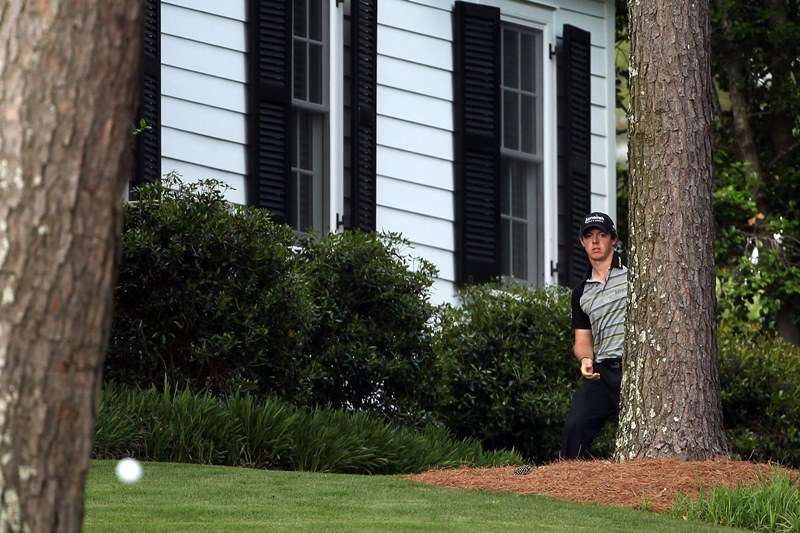
Nowhere to hide: After leading the 2011 Masters by four shots after 54 holes, McIlroy collapsed in the final round, carding an 80 (photo by Getty Images)
“Right after that 2011 Masters is when I noticed the biggest change in Rory,” says Tim Barter of Sky Sports, who has interviewed the Belfast-native more often than any other broadcaster or journalist.
“His body language changed that day. He wasn’t his usual confident self. He made the mistake of trying to protect his lead. And we all saw what happened.
“But he gained a lot from that experience. Look at the way he walks onto the first tee at tournaments these days. It’s very much, ‘I’m Rory McIlroy’ when he appears. Winning in Hong Kong at the end of 2011 was another turning point for him, I think. Until then, he’d never really been in a position where he had to make three pars to win a tournament. He showed then that – as well as being a wonderful ball-striker and all the rest of it – he has the temperament to close under pressure.
“Now, of course, when he’s at his best, no one can live with him. And he has always been one of the best interviews.
“He’s a great lad and is prepared to talk under any circumstances. And he always says what is in his head. He has never fudged an answer.
“The biggest change in him, however, is physical. Where he used to appear small, now he is a big lad. His biceps are enormous. And he stands taller. He reminds me of Tiger in his pomp in the way that he can intimidate just with his presence.”
Indeed, should McIlroy drive the ball anywhere near his best at Augusta next week it is hard to imagine him as anything less than the man to beat, no matter how well his rivals perform.
But golf is not just a physical test. Especially at Augusta National, the mental side of the game plays a huge part in deciding who wins and who loses. Who can forget four-time Masters runner-up Tom Weiskopf being asked what was going through Nicklaus’ head as the Golden Bear stood on the 16th tee in the final round?
“If I knew that I would have won this goddamn tournament,” responded the 1973 Open champion, combining humour with a clearly long held regret at chances lost.
“I do wonder about Rory’s motivation,” says Haney. “He’s made a lot of money. It’s human nature to ease off, but I don’t see the same dedication in him that I see in Jordan. There was the playing soccer thing last year. And the comments he made at the end of 2015 worried me. He said that the years Jordan and Jason just had motivated him. Which is fine. But when did Tiger ever need that sort of motivation? Rory basically admitted to being not as motivated as he once was, or compared to his biggest rivals. That’s a red flag for me.
“When it takes external motivation to get someone going, it isn’t typically sustainable. It’s short-term. The best motivation is internal, as it has clearly been for Jason and Jordan. And was for Tiger.”
Still, those reservations aside, McIlroy will not lack incentive in what will be his eighth Masters appearance.
“It would be foolish to give a young man too much stick for being a young man,” says swing coach and Sky commentator Denis Pugh.
“Rory has made some mistakes – that’s natural at his age – but through it all his phenomenal talent always shines through. So of course he is number one. He’s number one because he is number one. Everything else is just debate.
“Plus, the great thing is that Rory doesn’t make the same mistake twice. That’s so impressive. He gets something wrong, recognises that fact, then moves on. Rory is actually well short of where he is going to be at his very best. There is a lot more to come. He is so gifted and talented and he seems to have the right mindset; he will take not being number one next week in his stride.
“To come back from what happened at the Masters in 2011 then win the US Open was remarkable.
“If he does nothing else in his career, that is proof enough of his great mental strength. He’s tough.”
Tagged Augusta, Masters, Rory McIlroy, The Masters
